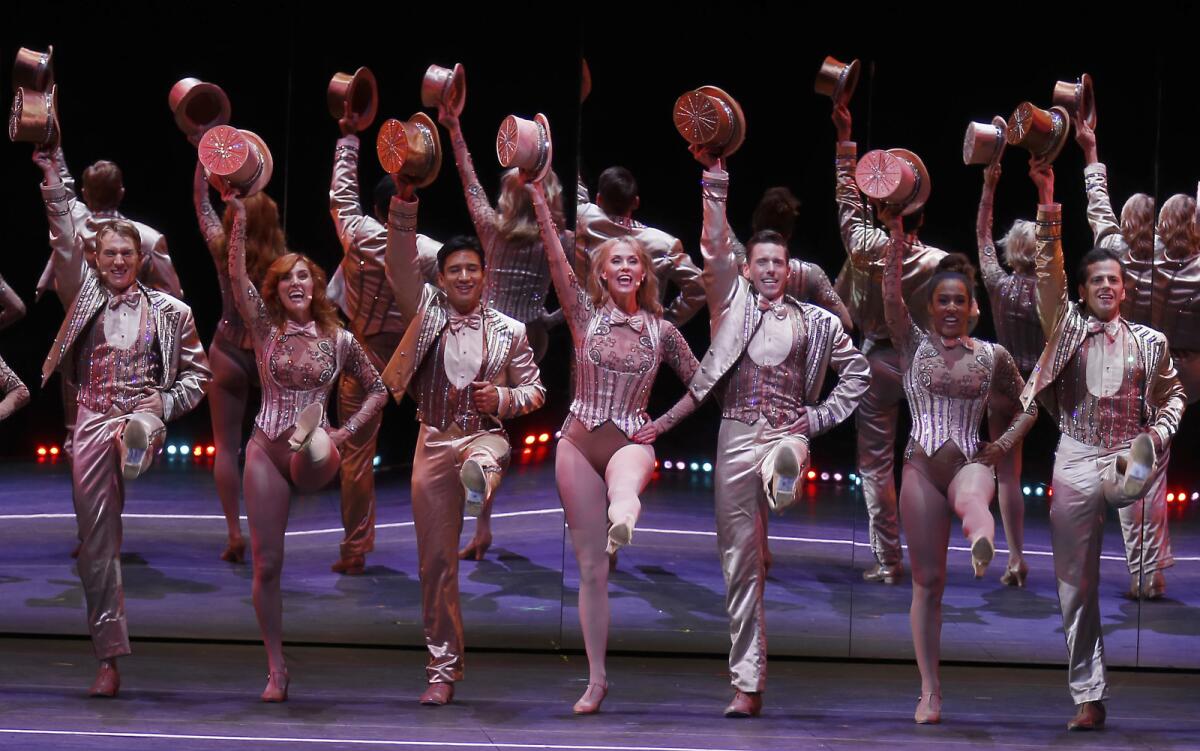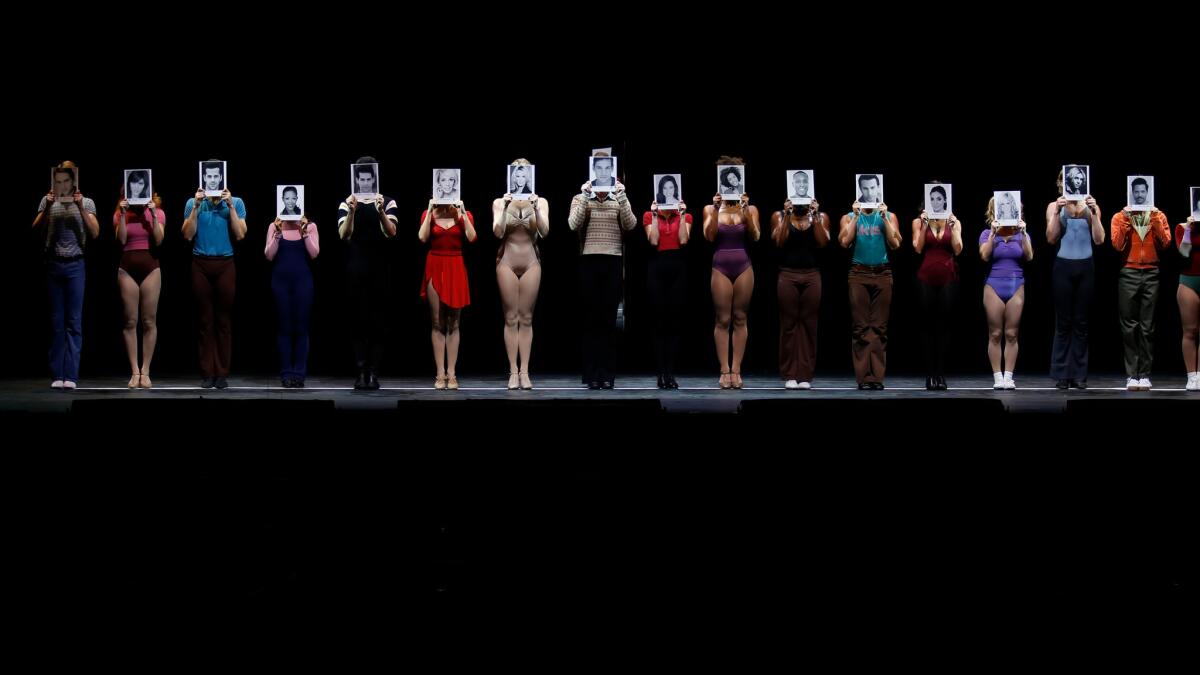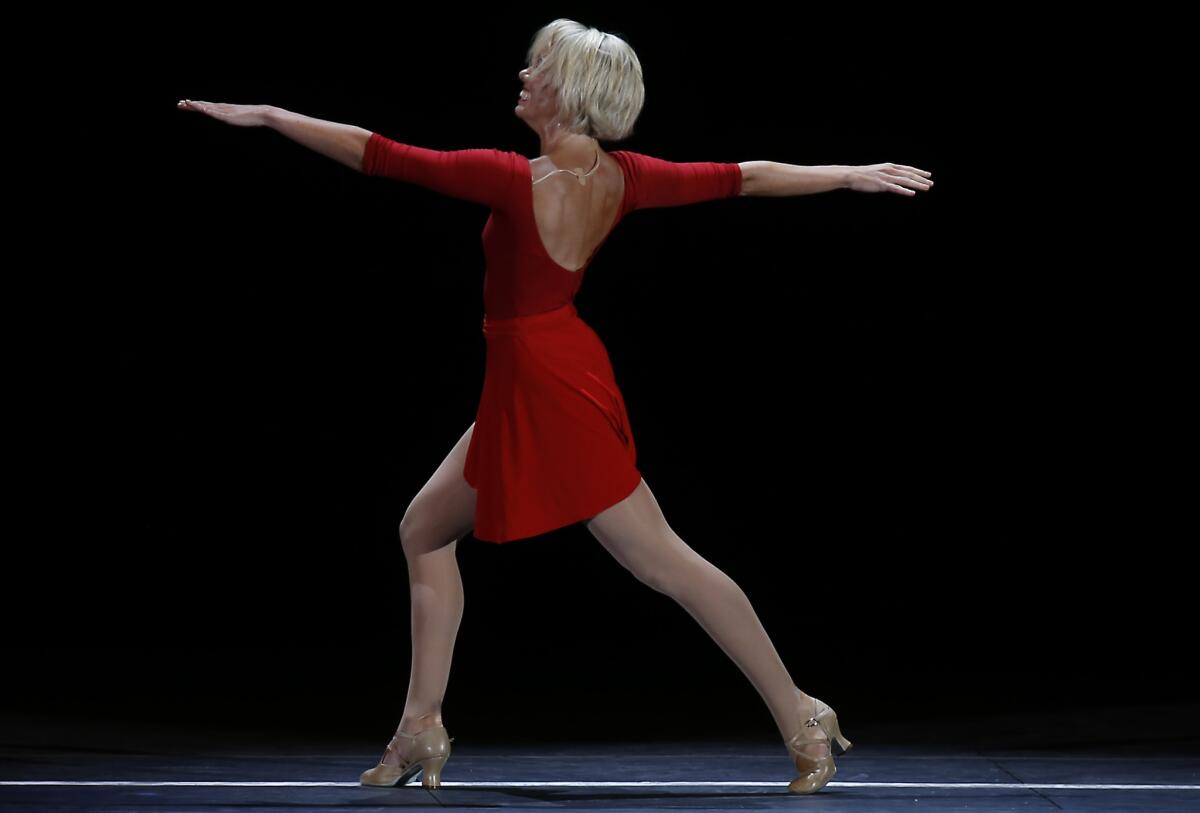Review: Still a singular sensation: ‘A Chorus Line’ at the Hollywood Bowl

“A Chorus Line” is an ideal musical for the Hollywood Bowl, and this weekend’s presentation faithfully staged by Baayork Lee didn’t disappoint.
The show’s presentational style works well in a vast outdoor theater. The set requirements are minimal, consisting mostly of a bare stage for nimble feet and a backdrop of mirrors never letting an audience forget it’s watching a performance. And the uncomplicated narrative structure is perfect for wine-sodden attention spans.
It also helps that the best moments occur via song and dance. (The Bowl, even with its jumbo screens, isn’t made for dramatic close-ups.) And then there’s that exciting build to the singular sensation “One,” the musical theater equivalent of a fireworks display.
Some things never grow old, and this Tony-winning Broadway landmark about a group of auditioning gypsy dancers who are asked by their director to reveal their personal stories as the group is whittled down to a tight ensemble remains terrifically moving. A “backstage” musical set at a Broadway theater devoid of divas, “A Chorus Line” speaks to workers everywhere who ply their trades in pursuit of anonymous excellence.
Conceived and originally directed and choreographed by Michael Bennett, the show, which debuted at Joseph Papp’s Public Theatre in 1975 before moving to Broadway where it had a legendary run, is timeless despite its time-capsule display of moods, fads, jokes and values.
There’s a distinct self-help tang to the monologues, which together form the jazziest group therapy session ever conducted. The book by James Kirkwood and Nicholas Dante repackages the interview testimony of real-life dancers into a dramatic litany that’s part liberation movement, part Dr. Joyce Brothers.
But devised as a theatrical competition for characters hankering for an ensemble turn in the limelight, “A Chorus Line” seems perfectly at home in this age of “The Voice” and other reality TV contests. And its recurring meditation on the plight of minorities in show business sounds very much like the diversity conversation happening today throughout the entertainment industry.

Marvin Hamlisch’s music conjures the hopes and dreams, the setbacks and resolve of the characters, and Edward Kleban’s lyrics provide simple and direct expression of feelings that are usually too difficult for these strivers to access. The orchestra, conducted by Patrick Vaccariello, brought out the score’s refreshing colors, a rainbow ice of Broadway melodies for a warm summer night.
“One” might be the rousing number that everyone associates with the show, but “What I Did for Love,” gracefully performed by Krysta Rodriguez (the luminous Broadway trouper who was in the lovely Deaf West revival of “Spring Awakening”) is the emotional apex — a love song directed not to a person but to a profession, one that requires more devotion than even the most demanding lover.
Mario Lopez played Zach, the autocratic director who will never settle for anything less than perfection. Completely at home onstage and able to sketch his character (who was modeled on Bennett) with a few precise stokes, he was so fluid as a musical theater performer that I had to double-check that he was indeed the same Mario Lopez who hosts the entertainment news program “Extra.”
Lopez’s program bio notes that he was a replacement in the Broadway revival of “A Chorus Line,” where he met his wife, Courtney Lopez, who shared the stage with him this weekend as the vocally challenged gypsy Kristine. He should do musicals more often and call it family time.
Several other cast members were also veterans of “A Chorus Line” — a smart move for a quickie Bowl production, which enlisted some topflight dance talent. In the cast were Robert Fairchild, a principal dancer with the New York City Ballet who recently starred in the Broadway production of “An American in Paris,” and Spencer Liff, who choreographed Deaf West’s preternaturally fluid “Spring Awakening.”

The role of Cassie, originated by Donna McKechnie, who won a Tony for the part, was cleanly performed by Sarah Bowden. Cassie’s the featured dancer trying to get a chorus gig after not working for a couple years. She’s also Zach’s ex, who’s not too happy about the breakup or what he considers her career retreat.
Bowden’s performance, which culminates in the big solo dance number “The Music and the Mirror,” communicates the show’s underlying theme — that there’s nobility in becoming part of a great collective, in subsuming your individual gifts for the realization of something more spectacular — while flaunting Cassie’s unique virtuosity. (Dreams of stardom never really die — they merely shift, accommodating themselves to reality.)
To name the standouts in the cast might go against the musical’s spirit, but I would be remiss in not commending Mara Davi for her powerhouse vocals as Maggie and Jason Tam for the dignified poignancy he brought to Paul San Marco, the Puerto Rican gay man who has to fight discrimination on two fronts.
Leigh Zimmerman delivered jaded Sheila’s wisecracks with zest. Sabrina Bryan’s spark plug Valerie, while not always in perfect tune, was a pint-sized force to be reckoned with.
Bob Avian, the musical’s original co-choreographer and the director of the Broadway revival, supervised the production, and there was nothing slapdash about Lee’s staging. (Lee created the role of Connie in “A Chorus Line” and restaged the original choreography for Avian’s Broadway revival, and her extensive experience showed.) Some judicious cutting would have benefited this outing of “A Chorus Line,” which ran longer than two hours without intermission.
But the show, a love letter to all those unsung talents that allow musicals to burn brighter, hasn’t lost any of its magic. At a moment when populism is on the rise and workers are demanding their due, the timing couldn’t be better for a production that makes stars out of Broadway’s blue-collar personnel.
More to Read
The biggest entertainment stories
Get our big stories about Hollywood, film, television, music, arts, culture and more right in your inbox as soon as they publish.
You may occasionally receive promotional content from the Los Angeles Times.











